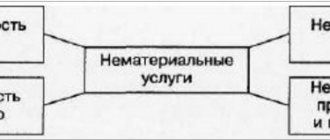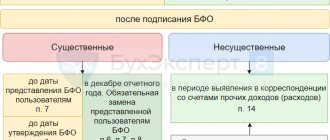Government duty
InfoAdvertising expenses are commercial, therefore, they are taken into account as part of current expenses (for example, in the “Sales Expenses” account).
Again, you can either take into account the amount of the fee at a time on the day of filing the application for a permit, or write it off gradually as future expenses, which is less rational. Video on the topic Please note All possible types of state duties are established in Chapter. 25.3 Tax Code of the Russian Federation. If the payment you made is not on this list, you cannot count it as a state duty.
If the state duty is transferred to the organization itself, but to an employee authorized by it, remind him to be sure to indicate in the payment documents which organization he is paying for.
Payers pay the state fee when applying to the Constitutional Court of the Russian Federation, courts of general jurisdiction, arbitration courts or magistrates - before filing a request, petition, statement, statement of claim, complaint (including appeal, cassation or supervisory) (clause 1, paragraph. 1 Article 333.18 of the Tax Code of the Russian Federation). According to paragraph 10 of Art. 13 of the Tax Code of the Russian Federation, state duty refers to federal fees.
Subclause 10, clause 1, art. 265 of the Tax Code of the Russian Federation provides that non-operating expenses include legal expenses and arbitration fees. Thus, the cost of paying the state duty is taken into account as part of non-operating expenses (letters of the Ministry of Finance of Russia dated 09/20/2010 N 03-03-06/1/597, dated 06/03/2010 N 03-03-06/1/373, dated 18.01. 2005 N 03-03-01-04/2/8).
In accordance with paragraphs. 1 clause 7 art.
Tax accounting of expenses for paying state duty when going to court
Almost any organization may have a situation where disputes with counterparties have to be resolved through the courts. In this case, additional costs inevitably arise, including the payment of state duties. The article describes how to correctly account for such expenses for tax purposes.
Article 101 of the Arbitration Procedural Code determines that legal costs consist of state fees and legal costs associated with the consideration of the case by the arbitration court.
State duty is a mandatory fee levied on organizations and individuals in accordance with Art. Art. 333.16 and 333.17 ch. 25.3 Tax Code of the Russian Federation. The grounds, rules for payment, as well as the procedure for granting a deferment or installment plan for the payment of state duties are established in accordance with the legislation of the Russian Federation on taxes and fees. This is stated in Art. 102 of the Arbitration Procedure Code of the Russian Federation.
The Tax Code stipulates that state duty payers are organizations that apply to courts of general jurisdiction, arbitration courts or magistrates for consideration of cases. In addition, they also recognize organizations that act as defendants when considering cases in courts, and in the event that the court decision is not made in their favor and the plaintiff is exempt from paying state duty (Article 333.17 of the Tax Code of the Russian Federation).
According to paragraphs. 1 clause 1 art. 333.18 of the Tax Code of the Russian Federation, when applying to arbitration courts, the state fee is paid before filing a statement of claim.
The amount of the state duty depends on the nature of the claim (property or non-property) and its price. In cases considered in arbitration courts, the size of the state duty and the specifics of its payment by organizations are determined in Art. Art. 333.21 and 333.22 of the Tax Code of the Russian Federation.
According to Art. 110 of the Arbitration Procedure Code of the Russian Federation, an organization that wins a dispute can reimburse its legal costs at the expense of the losing party. If the court partially satisfied the claim, legal costs may be divided between the parties in proportion to the size of the satisfied claims. If the persons participating in the case agree on the distribution of legal costs by a decision of the arbitration court, these costs are charged in accordance with this agreement. The basis is clause 4 of Art. 110 Arbitration Procedure Code of the Russian Federation.
State duty is a non-operating expense
If the state duty is paid by an enterprise for carrying out legally significant actions, which are defined in Chapter 25.3 of the Tax Code of the Russian Federation, then these costs can also be used as expenses for profit tax purposes. 3 Enter the state fee in accounting by debiting the accounts that correspond to the purpose of paying this fee. What expenses does state duty include in tax accounting? Advertising expenses are commercial, therefore, they are taken into account as part of current expenses (for example, in the “Sales Expenses” account).
Again, you can either take into account the amount of the fee at a time on the day of filing the application for a permit, or write it off gradually as future expenses, which is less rational. Video on the topic Please note All possible types of state duties are established in Chapter. 25.3 Tax Code of the Russian Federation.
To what account should the amount of state duty paid be attributed to the arbitration court? At 91 there are no options. The list of non-operating expenses is exhaustive, therefore expenses not specified in it cannot reduce the taxable profit of the enterprise.
On account 68.10, I put 91.2 When paying, I recommend reflecting on account 68. write-off at 91.2 ... and if you lose the trial, these costs cannot reduce the profit. You can read more here: D 68 to 51 - paid; 91.2 to 68 - accrued At 91.2 Non-operating expenses, the posting will be Dt 68 Kt 51Dt 91.2 Kt 68 The court costs include state duty and legal costs of Article 101 of the Arbitration Procedure Code of the Russian Federation. In our opinion, it is more logical to take into account the judicial state duty as non-operating expenses on the basis of paragraph 10, paragraph 1 of Article 265 Tax Code of the Russian Federation.
Attention: If the fee was paid in cash, you must obtain a receipt from the bank in the prescribed form. According to accounting rules, these documents may be the basis for accounting for state duties in the expenses of the enterprise. 2 Attribute the state duty to other expenses for the production and sale of the enterprise if its payment complies with the conditions of paragraph 1, paragraph 1, Article 264 of the Tax Code of the Russian Federation, with the exception of the situations listed in Article 270 of the Tax Code of the Russian Federation. If the state duty is paid by an enterprise for carrying out legally significant actions, which are defined in Chapter 25.3 of the Tax Code of the Russian Federation, then these costs can also be used as expenses for profit tax purposes. 3 Enter the state fee in accounting by debiting the accounts that correspond to the purpose of paying this fee. What can I say, correctly filling out the documents for paying the duty even causes more difficulties than accounting for it. You will need
- a document confirming the transfer of state duty indicating the name of your organization, accounting and tax documentation of your organization
Instruction 1 If you pay a state fee for registering a fixed asset (for example, ownership of a property or registering a car), then you can take these costs into account both as part of the initial cost of the fixed asset and as part of other expenses associated with production and implementation. Both of these options are possible in both accounting and tax accounting, and it’s up to you to decide which option to prefer. If you prefer to include the duty as part of other expenses, this can be done at a time on the date of payment.
>How to take into account the state duty when registering
State duty on property value
The procedure for reflecting state duty in accounting depends on what the payment of state duty is associated with and at what stage such payment is made.
If the state duty is paid in connection with the acquisition of property, then it is included in its original cost. However, if the duty is paid after the object has been accepted for accounting (put into operation), and the accounting rules do not provide for a change in the initial cost in such cases, the duty will be applied to expenses for ordinary activities or other expenses, depending on the to what type of activity the payment of this duty applies.
For example, the state duty paid for registering rights to real estate before the commissioning of the object is included in its initial cost (clauses 7, 8 PBU 6/01, Order of the Ministry of Finance dated October 31, 2000 No. 94n):
Debit of account 08 “Investments in non-current assets” - Credit of account 68
And if, for example, for the warehouse of a trading organization this duty is paid after the fixed asset object has been put into operation, the state duty will be reflected as follows (clause 14 of PBU 6/01):
Debit account 44 “Sales expenses” - Credit account 68
Actually, the payment of state duty is reflected as follows:
Debit account 68 - Credit account 51 “Current accounts”
What expenses does the state duty include?
→ → Current as of: April 25, 2021 State duty is a fee that is collected when applying to government agencies, local governments, other bodies or officials authorized by law to perform legally significant actions (). We will tell you how the state duty is reflected in accounting and tax accounting in our consultation.
If the state duty is paid in connection with the acquisition of property, then it is included in its original cost.
However, if the duty is paid after the object has been accepted for accounting (put into operation), and the accounting rules do not provide for a change in the initial cost in such cases, the duty will be applied to expenses for ordinary activities or other expenses, depending on the to what type of activity the payment of this duty applies. For example, the state duty paid for registering rights to real estate before putting the object into operation is included in its initial cost (,): Debit of account 08 “Investments in non-current assets” - Credit of account 68.
State duty for posting in accounting - the most complete information
» » Good morning, dear blog subscribers.
Today I was thinking about the topic of the blog, and in front of my eyes there was a payment order for payment of state duty and I thought, but we really don’t know accounting in this area at all.
This thought prompted me to create today’s article; it is a voluminous material with examples of postings and advice on which account is best to attribute the state duty to.
State duty is a federal fee in the form of payment for the performance by authorized officials of public authorities of certain legally significant actions.
It is quite natural that payment of duties is an expense for an enterprise.
But not everyone knows to which account to assign the state duty so that the posting is correct. Next, we will talk in more detail about how to reflect transactions in accounting to display accruals and pay state duties.
The expenses that the company incurred to pay the state duty are recognized in the reporting period in which these actions were directly performed. How long the organization will use the result does not matter.
For example, when a company pays a state fee for issuing a license (permission for a certain type of activity), then no matter what its validity period is, the expenses must be recognized in accounting in the period when the license was received.
Is the state duty non-operating expenses or indirect?
State duty is a payment for the performance of certain tasks by state institutions, and its reflection in accounting and tax accounting directly depends on what actions were paid.
Let's consider the difficulties that arise when classifying state duties as bank expenses, taking into account that the total amounts paid by a credit institution can be quite significant. The concept of state duty, its size, features and terms of payment, as well as payers are defined in Chapter. 25.3 parts of the second Tax Code of the Russian Federation. In accordance with paragraph.
1 tbsp. 333.16 of the Tax Code of the Russian Federation, state duty is a fee levied on the persons specified in Art.
333.
17 of the Tax Code of the Russian Federation, when they apply to state bodies, local government bodies, other bodies and (or) officials who are authorized in accordance with the legislative acts of the Russian Federation and constituent entities of the Russian Federation and regulatory legal acts of local government bodies, for committing in relation to these persons legally significant actions provided for in Chapter.
25.3 of the Tax Code of the Russian Federation, with the exception of actions performed by consular offices of the Russian Federation.
It has been established that the issuance of documents (their duplicates) is equivalent to legally significant actions. Article 333.
17 of the Tax Code of the Russian Federation determines that organizations and individuals are recognized as state duty payers if they: apply for the performance of legally significant actions provided for in this chapter; act as defendants in courts of general jurisdiction, arbitration courts, or in cases considered by magistrates, if the court decision is not made in their favor, and the plaintiff is exempt from paying state fees.
Costs of state duty in tax accounting
Free legal advice: All of Russia The procedure for collecting state duties is regulated by the Tax Code in Chapter.
25.3. The state duty is applied when applying to government agencies and officials authorized to perform certain legally significant actions. Both legal entities and individuals can pay this fee.
Business entities must reflect transactions for the calculation and payment of duties in accounting and tax accounting.
The method of reflecting the amount of state duty on accounting accounts depends on the type of government service for which the payment is made. Payment of a fee may be required, for example, in the following cases:
- participation of a business entity in litigation.
- registration of transactions within the main areas of the company’s work;
- amendments to constituent documents;
- registration of rights to property assets;
When state duty is calculated, accounting entries are made using account 68.
For separate accounting, subaccount 68/State Duty is introduced into the working chart of accounts.
When reflecting the duty, payment of which is necessary in connection with the acquisition of a property asset, the following entry is created in accounting:
- D08 – K68 / State duty. The correspondence includes the entire amount of duties paid to the state in the initial cost of the purchased object.
Fees that are paid in connection with activities that do not directly affect the main segment of the enterprise are taken into account as follows:
State duty in tax accounting
State duty is a payment for the performance of certain tasks by state institutions, and its reflection in accounting and tax accounting directly depends on what actions were paid.
Let's consider the difficulties that arise when classifying state duties as bank expenses, taking into account that the total amounts paid by a credit institution can be quite significant. The concept of state duty, its size, features and terms of payment, as well as payers are defined in Chapter. 25.3 parts of the second Tax Code of the Russian Federation. In accordance with paragraph.
1 tbsp. 333.16 of the Tax Code of the Russian Federation, state duty is a fee levied on the persons specified in Art.
333.
17 of the Tax Code of the Russian Federation, when they apply to state bodies, local government bodies, other bodies and (or) officials who are authorized in accordance with the legislative acts of the Russian Federation and constituent entities of the Russian Federation and regulatory legal acts of local government bodies, for committing in relation to these persons legally significant actions provided for in Chapter. 25.3 of the Tax Code of the Russian Federation, with the exception of actions performed by consular offices of the Russian Federation. It has been established that the issuance of documents (their duplicates) is equivalent to legally significant actions.
Article 333.
17 of the Tax Code of the Russian Federation determines that organizations and individuals are recognized as state duty payers if they: apply for the performance of legally significant actions provided for in this chapter; act as defendants in courts of general jurisdiction, arbitration courts, or in cases considered by magistrates, if the court decision is not made in their favor, and the plaintiff is exempt from paying state fees.
What expenses does state duty include in tax accounting?
In the case under consideration, the debt is repaid on the basis of a court decision; taking into account this fact, it is advisable to transfer the receivables reflected in account 76 to the subaccount “Settlements of claims” on the date of the court decision.
State duty Reflect the payment of state duty to the budget with the entry: DEBIT 68 subaccount “State duty” CREDIT 51 - state duty transferred to the budget. Tax accounting of state duty In tax accounting, the duty is included in other expenses on the date of accrual (subclause 1, paragraph.
1 tbsp. 264 of the Tax Code of the Russian Federation). The law does not say what is considered the date of calculation of the duty.
Therefore, we must be guided by the general principles of expense recognition.
Important That is, consider the date when three conditions are met as the accrual moment.
First, the duty is charged in accordance with legal requirements.
Secondly, the amount of the fee has been determined. Taxes and law Important
- State duty: accounting entries
- Government duty
- Accounting for state duties in accounting and tax accounting
- Basic entries in accounting for state duties
- Taxes and law
Taxes and law When tax accounting is also kept in accounts, we can say that, for example, for the state duty paid on real estate, the entries in accounting and tax accounting will be similar.
Also, say, in terms of state fees to court, accounting and tax accounting will be close.
And there are usually no differences.
For the purpose of calculating income tax, the “expenditure” state duty is taken into account as part of other expenses associated with production and sales (clause 1, clause 40, clause 1, article 264 of the Tax Code of the Russian Federation).
Taxes and Law
July 10, 2012 The list of actions for which a fee is charged is quite large.
This includes registering ownership of real estate, issuing various licenses and permits, registering a car, etc.
d. Depending on the grounds for payment, the amount of state duty is reflected in tax accounting differently.
The state duty is a fee levied on organizations and individuals when they apply to state and other bodies for the commission of legally significant actions in relation to these persons (clause
1 tbsp. 333.16 Tax Code of the Russian Federation). The list of such actions and the amounts of state duties paid in various situations are established by Chapter 25.3 of the Tax Code of the Russian Federation. The Tax Code does not provide for a separate rule that would regulate the procedure for accounting for state duties for profit tax purposes. It would seem that it should be included in other expenses on the basis of subparagraph 1 of paragraph 1 of Article 264 of the Tax Code of the Russian Federation.
After all, state duty is one of the federal taxes and fees (clause
10 tbsp. 13 of the Tax Code of the Russian Federation). But this version of its reflection is not correct in all situations.
Let's analyze the most common of them. Situation one: registration of rights to real estate For state registration of rights to real estate, including land plots, the organization must pay a state fee in the amount of 15,000 rubles. (Subclause 22, Clause 1, Article 333.33 of the Tax Code of the Russian Federation).
We are talking about state registration of such rights to real estate as the right of ownership, the right of economic management, the right of operational management (clause 1 of Article 131 of the Civil Code of the Russian Federation)
State duty on expenses
In addition to the duties paid after the property is registered (put into operation), duties not related to the acquisition of property will be directly included in the organization’s expenses. We are talking, for example, about the state fee when filing a statement of claim in court, the state fee for performing notarial acts, the fee for making changes to the constituent documents of the organization, etc. In these cases, when accounting for state duties in accounting, the entries (from the point of view of the debited account) may be different.
Court fees are usually reflected as part of the organization's other expenses:
Debit account 91 “Other income and expenses”, subaccount “Other expenses” - Credit account 68
The procedure for accounting for other duties depends on what type of activity the payment of the duty relates to.
So, for example, the state duty paid for amending the charter will be reflected as follows (clauses 5, 7 PBU 10/99, Order of the Ministry of Finance dated October 31, 2000 No. 94n):
Debit account 26 “General business expenses”, 44, etc. – Credit account 68
For example, the state duty paid for issuing a certificate for a released license plate unit when disposing of an organization’s vehicle will be reflected as follows (clause 11 of PBU 10/99):
Debit account 91, subaccount “Other expenses” - Credit account 68
Refund of state duty from the budget
If the proceedings in the case were terminated, or the application was left by the court without consideration, or the state duty was paid (collected) in excess, then the amount of the state duty (partially or fully) is returned to the taxpayer. The basis is the corresponding indication in the court decision.
So, according to paragraph 2 of Art. 129 of the Arbitration Procedure Code of the Russian Federation, when the court makes a ruling on the return of the statement of claim, the arbitration court decides the issue of returning from the federal budget the state duty paid by the plaintiff.
The refund of the state duty to the taxpayer is carried out in accordance with Art. 78 of the Tax Code, taking into account the features established by Ch. 25.3 of the Code.
The procedure for a taxpayer’s actions when returning state duty is determined by clause 3 of Art. 333.40 Tax Code of the Russian Federation. An application for the return of the overpaid (collected) amount of state duty is submitted to the tax authority at the location of the court in which the case was heard. The application is accompanied by decisions, rulings and certificates from the courts regarding the circumstances that are the basis for a full or partial refund of the overpaid (collected) amount of state duty.
If the state duty is refundable in full, then along with the above documents, original payment documents (orders and receipts confirming payment of the state duty) are also submitted. If the state duty is partially refundable, copies of payment documents.
This procedure has been in effect since January 31, 2006 in connection with the provisions of Federal Law dated December 31, 2005 N 201-FZ.
The taxpayer has the right to a refund of the state duty within three years from the date of payment. In other words, the corresponding application must be submitted before this period expires.
The tax authority is obliged to return the amount of state duty within a month from the date the taxpayer submits the application. Otherwise, the tax authority may be charged interest on the amount of state duty not returned within the prescribed period, calculated based on the refinancing rate of the Bank of Russia (clause 9 of Article 78 of the Tax Code of the Russian Federation).
In tax accounting, the organization includes the amount of returned state duty as part of non-operating income. This is stated in paragraph 3 of Art. 250 Tax Code of the Russian Federation.
An organization using the accrual method recognizes non-operating income based on the procedure established by Art. 271 Tax Code of the Russian Federation. According to this procedure, the amount of state duty returned to the organization is reflected in non-operating income on the date of entry into force of the court decision on such return.
A similar position regarding the procedure for recording and recognizing returned state duty is set out in Letters of the Ministry of Finance of Russia dated January 18, 2005 N 03-03-01-04/2/8 and dated July 1, 2005 N 03-03-04/1/37.
Under the cash method, the amount of the refunded state duty is recognized in the manner provided for in Art. 273 of the Tax Code of the Russian Federation, - as funds arrive in the taxpayer’s account or cash desk.
In the corporate income tax return for the reporting (tax) period, the amount of non-operating income in the form of returned state duty is reflected in line 100 “Non-operating income - total” of Appendix No. 1 to sheet 02 and, accordingly, is included in the total line 020 “Non-operating income” of sheet 02.
Example 2 . CJSC Aton filed a claim with the arbitration court to recover a penalty in the amount of 100,000 rubles from its supplier. for violation of the terms of a business contract. On the same day, before submitting the application, Aton CJSC paid the state fee.
The amount of state duty was calculated according to paragraphs. 1 clause 1 art. 333.21 Tax Code of the Russian Federation. It states that in property cases considered in arbitration courts, if the value of the claim is from 50,001 to 100,000 rubles. The fee is 2000 rubles. plus 3% of the amount exceeding RUB 50,000.
Thus, the amount of state duty paid by Aton CJSC amounted to 3,500 rubles. [2000 rub. + (RUB 100,000 - RUB 50,000) x 3% : 100%].
However, when considering the case in the court of first instance before the court decision was made, the plaintiff (Aton CJSC) reduced the amount of claims to 60,000 rubles. The arbitration court recognized this as not contrary to the law and not violating the rights of other persons.
If the plaintiff reduces the amount of the claim, the amount of the overpaid state duty shall be refunded. In accordance with paragraphs. 1 clause 1 art. 333.40 of the Tax Code of the Russian Federation, the state duty is subject to partial or full refund if it is paid in a larger amount than provided for in Chapter. 25.3 of the Code.
The amount of state duty, calculated based on the new price of the claim, amounted to 2,300 rubles. [2000 rub. + (60,000 rub. - 50,000 rub.) x 3% : 100%].
Thus, on the date of filing the statement of claim to reduce the size of the claim, the plaintiff must be returned 1,200 rubles. (3500 rub. - 2300 rub.).
As already noted, the refund of the overpaid amount of state duty is made upon the application of the taxpayer (plaintiff) to the tax authority. The application is accompanied by the relevant court rulings (decisions) and payment documents referred to in clause 3 of Art. 333.40 of the Tax Code of the Russian Federation, which confirm the fact of payment of the state duty.
Let's assume that Aton CJSC lost the case and its legal costs were not reimbursed. In this case, the organization’s accountant must make the following entries in accounting:
Debit 68 subaccount “Calculations for payment of state duties” Credit 51
- 3500 rub. — the state fee for consideration of the case in the arbitration court is transferred;
Debit 91-2 Credit 68 subaccount “Calculations for payment of state duties”
- 3500 rub. — the amount of the state duty paid is reflected in non-operating expenses;
Debit 68 subaccount “Calculations for payment of state duties” Credit 91-1
- 1200 rub. — the debt of the tax authority for the refund of state duty is reflected (as of the date of filing the relevant application);
Debit 51 credit 68 subaccount “Calculations for payment of state duties”
- 1200 rub. — the amount of overpaid state duty was returned to the bank account of Aton CJSC.
In tax accounting, the accountant of Aton CJSC reflects:
- as part of non-operating expenses - 3,500 rubles;
- as part of non-operating income - 1200 rubles.
State duty on expenses
In addition to the duties paid after the property is registered (put into operation), duties not related to the acquisition of property will be directly included in the organization’s expenses. We are talking, for example, about the state fee when filing a statement of claim in court, the state fee for performing notarial acts, the fee for making changes to the constituent documents of the organization, etc. In these cases, when accounting for state duties in accounting, the entries (from the point of view of the debited account) may be different.
Court fees are usually reflected as part of the organization's other expenses:
Debit account 91 “Other income and expenses”, subaccount “Other expenses” - Credit account 68.
The procedure for accounting for other duties depends on what type of activity the payment of the duty relates to.
So, for example, the state duty paid for amending the charter will be reflected as follows (clauses 5, 7 PBU 10/99, Order of the Ministry of Finance dated October 31, 2000 No. 94n):
Debit account 26 “General business expenses”, 44, etc. – Credit account 68.
[1]
For example, the state duty paid for issuing a certificate for a released license plate unit when disposing of an organization’s vehicle will be reflected as follows (clause 11 of PBU 10/99):
Debit account 91, subaccount “Other expenses” - Credit account 68.
How is state duty accepted for tax accounting?
The procedure for recognizing state duty in tax accounting is as follows. If we are talking about the state duty for registering vehicles or real estate, which was paid before putting such objects into operation, the duty increases their initial cost. And if paid later, it is expensed (Letters of the Ministry of Finance dated 06/08/2012 No. 03-03-06/1/295, dated 02/11/2011 No. 03-03-06/1/89, dated 06/01/2007 No. 03-03- 06/2/101). When tax accounting is also kept in accounts, we can say that, for example, for the state duty paid on real estate, the entries in accounting and tax accounting will be similar. Also, say, in terms of state fees to court, accounting and tax accounting will be close. And there are usually no differences.
For the purpose of calculating income tax, the “expenditure” state duty is taken into account as part of other expenses associated with production and sales (clause 1, clause 40, clause 1, article 264 of the Tax Code of the Russian Federation). In this case, the state duty reimbursed on the basis of a court decision is taken into account by the defendant in expenses, and by the plaintiff in income on the date the court decision enters into legal force (Letters of the Ministry of Finance dated January 13, 2015 No. 03-03-06/1/69458, dated July 24, 2013 No. 03- 03-05/29184).
The peculiarity of accounting for state duty under the simplified tax system “income minus expenses” is that it is recognized at the time of payment (clause 22, clause 1, article 346.16, clause 1, article 346.17 of the Tax Code of the Russian Federation).
Quartz
In accordance with the Tax Code of the Russian Federation, a state duty is a fee levied on organizations and individuals when they apply to state bodies, local governments, other bodies and (or) officials who are authorized in accordance with the legislative acts of the Russian Federation , legislative acts of the constituent entities of the Russian Federation and regulatory legal acts of local governments, for the performance of legally significant actions in relation to these persons provided for by the Tax Code, with the exception of actions performed by consular offices of the Russian Federation, namely:
- when applying to courts of general jurisdiction, to magistrates;
- when applying to arbitration courts;
- when applying to the Constitutional Court of the Russian Federation and constitutional (statutory) courts of the constituent entities of the Russian Federation;
- for notarial acts;
- for actions related to civil registration;
- for actions related to the acquisition of citizenship of the Russian Federation or renunciation of citizenship of the Russian Federation, as well as entry into the Russian Federation or departure from the Russian Federation;
- for actions related to the official registration of a program for electronic computers, a database and an integrated circuit topology;
- for the actions of authorized government agencies in the implementation of federal assay supervision;
- for the actions of the authorized executive body during the state registration of medicinal products;
- for the actions of the authorized executive body during the state registration of medical devices;
- for state registration of legal entities, political parties, mass media, issues of securities, property rights, vehicles, etc.
Among other things, the Tax Code of the Russian Federation provides for state duties for:
- the right to use the names “Russia”, “Russian Federation” and words and phrases formed on their basis in the names of legal entities;
- the right to export cultural values, collectibles
paleontology and mineralogy;
- issuing permits for transboundary movement of hazardous waste;
- issuing permits for the export from the territory of the Russian Federation, as well as for the import into the territory of the Russian Federation, of species of animals and plants, their parts or derivatives, subject to the Convention on International Trade in Endangered Species of Wild Fauna and Flora.
How to take into account state duty in accounting
In accounting, the state duty is reflected in the following entries:
| Wiring | Operation |
| D 68 - K 51 | State duty paid |
| D 08 - K 68 | The state duty is included in the initial cost of the fixed assets (real estate, car) |
| D 20 (26, 44) - K 68 | State duty on transactions related to the normal activities of the organization is taken into account (for example, when registering a lease agreement) |
| D 91-2 - K 68 | The state duty paid when applying to court, reimbursed by court decision, for other transactions not related to the ordinary activities of the organization (for example, when selling a share in the authorized capital) is taken into account. |
How to take into account the cost of state duty for income tax purposes and under the simplified tax system
Tax accounting of state duty depends on its type.
The state duty for registering rights to real estate and for registering cars both under the OSN and under the simplified tax system is taken into account depending on when it is paid:
- if before the facility is put into operation, it is included in the initial cost of the operating system;
- if after putting the facility into operation, it is taken into account in expenses at a time.
The state fee paid by an organization when filing an application, statement of claim, complaint (appeal, cassation or supervisory) in court (arbitration or general jurisdiction), both under the OSN and under the simplified tax system, is taken into account in expenses.
The state fee, which the court decides to reimburse the defendant, is taken into account:
1) the defendant has expenses:
- in case of OSN - on the date of entry into force of the court decision;
- under the simplified tax system - on the date of payment;
2) the plaintiff’s income:
- in case of OSN - on the date of entry into force of the court decision;
- under the simplified tax system - on the date of receipt of money.
In other cases, both under the OSN and under the simplified tax system, the state duty is taken into account in expenses on the payment date, which always coincides with the accrual date.
This also applies to state fees for state registration:
- changes made to the organization's charter (Unified State Register of Legal Entities);
- real estate lease agreement concluded for a period of at least one year;
- rights to land plots.
How to reflect the state duty in income tax returns and the simplified tax system
In the income tax return, the state duty paid by the organization (except for that included in the initial cost of fixed assets) is reflected on line 041 of Appendix No. 2 to Sheet 02 on an accrual basis in the total amount of taxes and fees accrued in the reporting (tax) period.
In the tax return under the simplified tax system in Section 2.2, in the total amount of expenses incurred, the amounts of state duty (except for those included in the initial cost of fixed assets) paid during:
- I quarter - on line 220;
- half a year - on line 221;
- 9 months - on line 222;
- year - on line 223.
The Department of Tax and Customs Policy has reviewed the appeal and reports the following.
According to subparagraph 10 of paragraph 1 of Article 265 of the Tax Code of the Russian Federation (hereinafter referred to as the Tax Code of the Russian Federation), court costs and arbitration fees can be taken into account when calculating corporate income tax as part of non-operating expenses.
Based on subparagraph 1 of paragraph 7 of Article 272 of the Tax Code of the Russian Federation, the date of non-operating and other expenses is the date of accrual of taxes (fees) - for expenses in the form of amounts of taxes (advance payments for taxes), fees and other obligatory payments.
Thus, the date of recognition for profit tax purposes of expenses in the form of state duty paid when filing a claim in an arbitration court is the date of accrual of this type of federal tax. Moreover, the amount of the accrued federal tax is taken into account in tax accounting at a time at the time of filing a statement of claim in court.
In accordance with paragraph 3 of Article 250 of the Tax Code of the Russian Federation, non-operating income of a taxpayer is recognized, in particular, income in the form of fines, penalties and (or) other sanctions for violation of contractual obligations recognized by the debtor or payable by the debtor on the basis of a court decision that has entered into legal force, as well as amounts of compensation for losses or damages.
According to subparagraph 4 of paragraph 4 of Article 271 of the Tax Code of the Russian Federation, the date of recognition of non-operating income in the form of fines, penalties and (or) other sanctions for violation of contractual or debt obligations, as well as in the form of amounts of compensation for losses (damage) is the date of recognition by the debtor or the date of entry into legal the force of the court decision.
Thus, the amount of the state duty, as well as the amount of legal costs reimbursed on the basis of a court decision, are taken into account as part of non-operating income on the date the court decision enters into legal force.
| Deputy Director of the Department | A.A. Smirnov |
State duty for indirect or non-operating
The exception is cases when the organization’s activities are related to the provision of services.
These taxpayers have the right to attribute the amount of direct expenses of the reporting (tax) period in full to the reduction of income from production and sales of this reporting (tax) period without distribution to the balances of work in progress. The company determines whether expenses are classified as direct or indirect expenses separately for each production cycle.
https://www.youtube.com/watch?v=RlsqiB4Jjsc
Indirect costs include: administrative - ; expenses for heating and lighting of premises;
advokatregion
Or is this difference reflected somewhere else?
But you can’t change anything, it was so, it will remain so, unless the people rise up against the policies of the state.
Don’t torment yourself, don’t change anything. Free travel for deputies already played a cruel joke on us when Yeltsin was rushing to the elections in a trolleybus.
Who knows, if he had asked for the fare then, maybe now we would be a prosperous country.
Therefore, cancel their benefits! According to Article 318 of the Tax Code of the Russian Federation, the amount of indirect costs of production
In most cases, the paid state duty can be recognized in tax accounting at a time (Vaitman E., Yuropov R.)
(clauses 1 and 2 of clause 1 of Article 333.28 of the Tax Code of the Russian Federation). In addition, the state duty has increased: - for issuing permits for the attraction and use of foreign workers - from 6,000 to 10,000 rubles. for each foreigner (clause 23 p.
1 tbsp. 333.28 of the Tax Code of the Russian Federation); - for state registration of rights to real estate - for organizations from 15,000 to 22,000 rubles, for individuals from 1,000 to 2,000 rubles. (clause 22, clause 1, article 333.33 of the Tax Code of the Russian Federation); - for state registration of cars - from 1500 to 2000 rubles, motorcycles, trailers, tractors, self-propelled road construction and other self-propelled machines - from 1000 to 1500 rubles.
(Clause 36, Clause 1, Article 333.33 of the Tax Code of the Russian Federation); - for issuing permission to install an advertising structure - from 3,000 to 5,000 rubles. (Clause 71, Clause 1, Article 333.33 of the Tax Code of the Russian Federation)
What the law says
The Tax Code of the Russian Federation, as well as its norms devoted to simplifications, does not say whether state duty is accepted as expenses under the simplified tax system. At the same time, companies and individual entrepreneurs using the simplified tax system are faced with this mandatory payment everywhere: in court, in the tax service, and in other structures. That is, it can be argued that without paying state duties, activities under the simplified regime are virtually impossible.
However, we can safely conclude that the state duty under the simplified tax system is included in expenses on the basis of subclause. 22 clause 1 art. 346.16 Tax Code of the Russian Federation. This paragraph lists the costs that, in the final calculation, reduce the single tax on the simplified tax system.
This norm mentions only taxes and fees paid in accordance with tax legislation. So is the state duty an expense under the simplified tax system? Definitely - YES!
Issues related to state duty are regulated by Chapter 25.3 of the Tax Code of the Russian Federation. Based on paragraph 1 of Art. 333.16 of the Code, the state duty refers specifically to fees when applying to:
- Government structures.
- Local authorities.
- Other bodies and/or officials who are legally authorized to perform legally significant actions.
There should be no controversy as to whether state duty is taken into account in expenses under the simplified tax system when a document or a duplicate of it is issued to a simplifier for a fee. Yes, this is equated by law to legally significant actions.
As follows from the meaning of sub. 22 clause 1 art. 346.16 of the Tax Code of the Russian Federation, state duty is accepted as expenses under the simplified tax system in any amount upon its transfer to the treasury to the appropriate account.
Another important point: the state duty is taken into account in expenses under the simplified tax system also when calculating the advance payment.
A simplifier can save a little when installing an advertising structure. The state duty is included in the costs of the simplified tax system if it is transferred for this service, permitted by local authorities. For 2021, its size is 5,000 rubles.
At the same time, the simplifiers have no right to attribute the fee for the right to install and operate an advertising structure as expenses. The Ministry of Finance and the Federal Tax Service believe there, since clause 1 of Art. 346.16 of the Tax Code of the Russian Federation there is no corresponding position (letters dated 09/01/2014 No. 03-11-06/2/43627 and dated 08/06/2014 No. GD-4-3/15322).
Are state duties included in expenses during simplification?
The list of costs taken into account when determining the single tax during simplification is indicated in Art. 346.16 Tax Code of the Russian Federation. According to sub. 31 clause 1 of the above-mentioned article, the state duty under the simplified tax system, income minus expenses, reduces the tax base. But according to paragraph 2 of Art. 346.16 of the Tax Code of the Russian Federation, costs must meet the requirements of paragraph 1 of Art. 252 of the Code.
First of all, this paragraph mentions the economic feasibility of expenses. This means that as a result of paying the state duty, some significant result must be obtained. Otherwise, the fee paid cannot be considered an expense.
This applies, for example, to situations where, when submitting an application to make changes to the Unified State Register of Legal Entities, the registration action was refused due to an error made by an employee of the enterprise when filling out the form. In this situation, the paid state fee is not returned to the legal entity, but cannot be accepted as expenses.
IMPORTANT! In case of reimbursement of state duty to an enterprise by a court decision, the amount received must be included in income. This is how the Ministry of Finance of the Russian Federation interprets the norms of the code in letters dated 02/20/2012 No. 03-11-06/2/29, dated 05/17/2013 No. 03-11-06/2/17357.
Read about what expenses are accepted for accounting under the simplified tax system here.
How the state duty is taken into account during simplification: postings
To reflect the operation of calculating state duty in accounting, it is necessary to remember that, according to Art. 333.40 of the Tax Code of the Russian Federation, in certain cases, the duty may be returned to the payer or, at his request, offset against other actions of government agencies. Therefore, until the expected legally significant action is completed (or a government agency refuses to perform it), the duty cannot be included as an expense either in accounting or tax accounting.
For mutual settlements with government agencies for payment of state duties, you should open a special sub-account to account 68. The postings will be as follows:
- Dt 68 Kt 51 (50) - payment of state duty;
- Dt 20, 23, 25, 26, 29, 44, 91 Kt 68 - charge of state duty;
- Dt 91 Kt 68 - payment of the state duty is attributed to non-operating expenses in connection with the refusal to perform a legally significant action;
- Dt 08 Kt 68 - the duty increased the initial cost of the property;
- Dt 51 Kt 68 - state tax is returned to the payer’s account.
The attribution of state duty to expenses during simplification depends on why such a duty was paid, as well as on whether this action was carried out or a refusal was received from government agencies.







